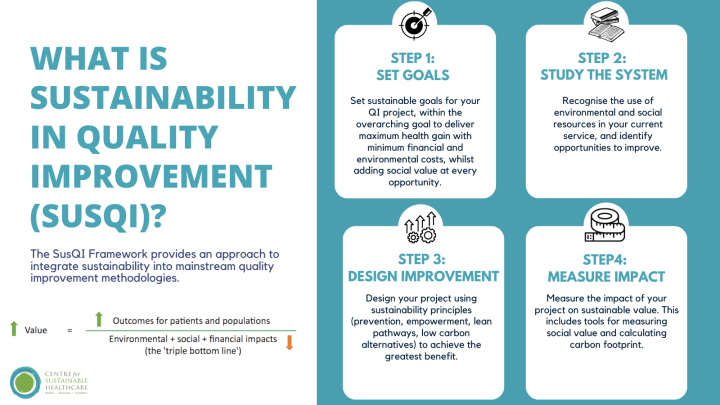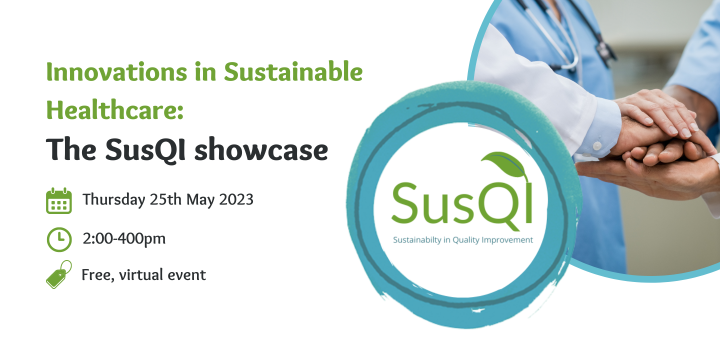Innovation in Sustainable Healthcare: the SusQI Showcase 2023
Are you interested in environmental sustainability and improving healthcare? Would you like to find out what you can do to make your workplace more sustainable? Are you excited to hear success stories from others making sustainable changes and shaping the future of healthcare?
Discover the latest developments in SusQI at our upcoming SusQI showcase 2023.
What is SusQI?
Sustainability in Quality Improvement (SusQI) (https://www.susqi.org/) is an approach to improving healthcare in a holistic way, by assessing quality and value through the lens of a “triple bottom line”. Triple bottom line analysis looks at the social, financial, and environmental impact of any intervention, to truly assess its value whilst aiming to improve patient health outcomes.

SusQI is designed to embed sustainability into existing QI methods and practice, providing healthcare workers with the tools to create sustainable change within their workplace through QI projects. Changes are focused on the CSH principles of sustainable clinical practice: prevention, patient empowerment and self-care, lean clinical pathways, and low-carbon alternatives.
How is SusQI used in healthcare?
Healthcare professionals across the UK are already implementing SusQI projects in their workplaces, helping to build a more sustainable healthcare system. From changing prescribing practices to eliminating low-value activity and reducing equipment use, there are many opportunities to create sustainable change.
In October 2022, the Infection Prevention and Control Team at Northampton General Hospital championed a project to reduce unnecessary PPE usage throughout the hospital. Education surrounding appropriate PPE use resulted in a 4.3% reduction in inappropriate glove use and a 22.1% reduction in inappropriate apron use across 2 months. Extrapolated across the year, a minimum annual saving of 25,974 kgCO2e will be achieved, a value equivalent to 110 return journeys from Northampton to Glasgow! There are also great financial savings, with a minimum of over £23,000 saved annually when data from the two months studied is extrapolated over the year. Staff have been given more confidence about when to use PPE and overall this project has led to environmental, financial, and social advantages. PPE is used in every healthcare setting, and it is great to see a project making such as simple but beneficial change!
Change can also stem from smaller, and more specific SusQI projects. In the past year, staff at Oakfield Street Surgery, Wales, have been working to make blue inhalers more green. The team, led by pharmacist prescriber Jackie Reynolds, looked to reduce the number of patients receiving three or more SABA inhalers per year. Most SABA inhalers are prescribed as metered dose inhalers (MDIs): the inhaler device with the highest carbon footprint.
This project has had significant environmental, social, and economic benefits. A 28% reduction of SABA inhaler prescriptions in six months has saved 37,646 kgCO2e, equivalent to driving 108,427 miles in an average car! Socially, there has been positive feedback from patients whose medication has been optimized. Patients are also happy to lower their personal carbon footprint. Finally, this project has saved £1,298, a significant financial benefit! In these ways, this SusQI project has created positive and sustainable change within the GP surgery.
Where can I learn more?
The Centre for Sustainable Healthcare are hosting a free SusQI showcase 2023, where all are welcome. Learn more about the latest developments in SusQI education and practice, and network with like-minded individuals at this two-hour virtual event on Thursday 25th May 2023 2-4 pm.
Sign up here.

If you’re looking to make a change and help transform our healthcare system into a more sustainable place, we’d love to see you there!

